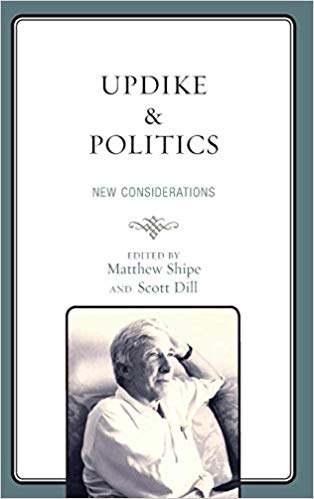In under three weeks Updike fans can finally read the much-anticipated Updike & Politics: New Considerations, edited by Matthew Shipe and Scott Dill.

The collection of essays, to be published on July 15 by Lexington Books, features essays from Marshall Boswell, Kirk Curnutt, Dill, Biljana Dojcinovic, Michial Farmer, Ethan Fishman, Yoav Fromer, Jo Gill, Louis Gordon, Sylvie Mathé, Takashi Nakatani, Judie Newman, James Schiff, Pradipta Sengupta, Shipe, and Aleksandra Vukotic.
As the back cover copy proclaims, “Presenting the first interdisciplinary consideration of John Updike’s political thought, Updike & Politics establishes a new scholarly foundation for assessing one of the most recognized and significant American writers of the post-1945 period. Bringing together a diverse group of American and international scholars, including contributors from Japan, India, France, Serbia, Israel, and the United Kingdom, this volume presents the most comprehensive exploration of the rich political commentary that runs through Updike’s work. Like Updike himself, the collection endeavors to be comprehensive as it covers a wide range of the work he produced during his fifty-year career, including his too-often overlooked poetry and his single play [Buchanan Dying]. The chapters address a variety of political issues, from the traditional aspects of power, rights, equality, justice, or violence, to the more divisive issues in Updike’s work such as race, gender, imperialism, hegemony, and the rise of neoliberalism.”
“This collection of essays adds depth to our understanding of Updike as a political writer,” writes Liliana M. Naydan (Penn State Abington) in her cover blurb. “The book is especially valuable to scholars of late-twentieth and early twenty-first century literature for its investigations of intersections between the personal and the political. It exposes Updike’s nuanced perspectives on institutions such as the American presidency, and it provides thought-provoking explorations of politically charged and transformative American experiences including the War in Vietnam, the Cold War, and the attacks of September 11, 2001.”
